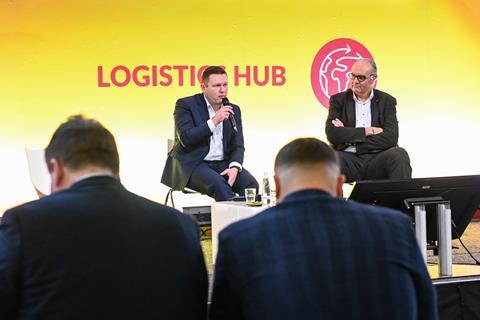The Logistics Hub hosted a panel discussion involving Maersk’s Bruce Marshall and Rafael Llerena of Easyfresh

Fruitnet’s Michael Barker hosted a panel discussion looking at the future of the perishable logistics business, on the opening day of Fruit Logistica in Berlin.
Held on the Logistics Hub stage, the panel included Bruce Marshall, head of reefer solutions at Maersk, and Rafael Llerena, CEO of Easyfresh.
It has been a tough few years for the shipping industry, with everything from Covid and the war in Ukraine to trouble in the Red Sea. How difficult is it to be in the shipping business right now, and what are your main challenges?
Bruce Marshall: I’ll start with the shippers and our customers, because they feel the brunt of it. They have a planned supply chain, and that supply chain is becoming more and more difficult to manage, there is no doubt about that.
If I take it from our perspective, it’s also challenging. Getting equipment flows planned, our schedules staying on time – these are all complications that in the normal run of things are not too severed to manage, but there is always a problem with something, it’s a question of severity.
The current Red Sea problem, for example. The discussion comes and goes so rapidly and it’s not just that week, it’s the three or four weeks after that once the cargo is on the water.
There are surcharges coming. There are extra costs for us, which result in surcharges for our customers. We don’t do it because want to, we simply cannot carry the can for everything.
Rafael Llerena: Given the disruptions we’re having, the challenges in coordinating the change of mode from a shipping line, to a terminal, to a truck – that is where we are having problems. This is made by people, and for me this is not new and happens across all areas.
You need good, motivated people, troubleshooters who work hard and take care of the business. The disruptions themselves are a problem of course, but to get people who can solve the problems is the most important thing.
There is another factor which is costs, which are rising for many reasons and have to be passed on to the customer, and this unfortunately has to be swallowed.
Let’s look at costs, which have become a real problem for many. As difficult as it is to predict, how do you see things progressing?
BM: This is the crystal ball question. Things are definitely calming down. The peaks that we had during Covid, I don’t see those happening.
The biggest bottleneck, the thing that is creating an extra cost aspect, is the whole Red Sea discussion, and I’ll give you some numbers. Transit times from the west coast of Latin America into the Middle East was 32-35 days. Now, the transit time from Ecuador to Jebel Ali is 45 days. On top of that, to evacuate equipment back out is also taking another two to three weeks longer than it did in the past. That places a lot more strain on things.
Then there are a lot more transhipments to get in out of the Middle East, and you are also speeding up the ships to go around the Cape, so extra fuels costs. All of these things are adding up.
The big thing for me right now is the Red Sea, and all the subsequent costs and surcharges, and the question is how long it goes on for. Your guess is as good as mine.
RL: If we are talking increased costs, on the one hand we had the big impact of inflation after the pandemic, but there are other things happening now like the green pact, including the implementation of the ETS.
There are certain aspects of the different fragments of the cold chain chain, whether that is shipping or trucks, where the green pact is provoking increased costs. Yes, for good reason ultimately, but you only have to read the paper to see how the agricultural industry is doing – protests and such. So these green measures are increasing costs. Are they in proportion? I don’t know.



